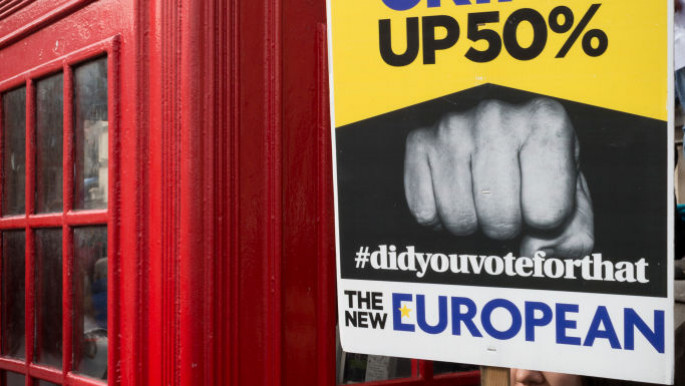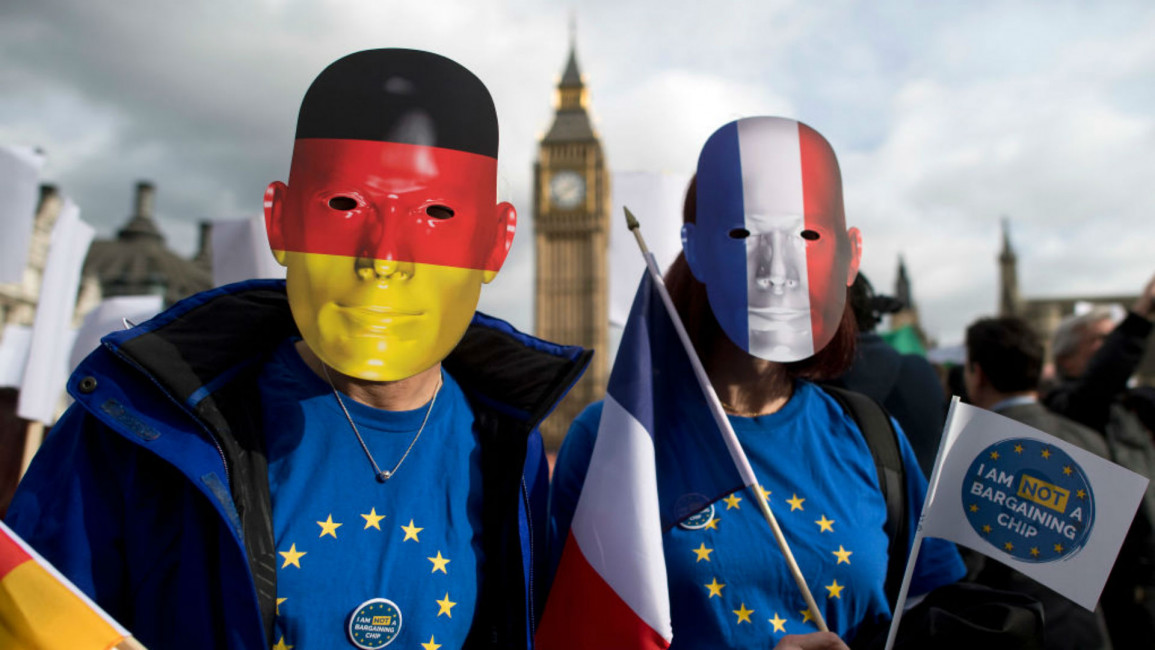
Brexit or not, these EU elections still matter. Here's why
For Europeans who care about how EU policy trickles down and impacts their lives and communities, it's an opportunity that only comes round every 1,825 days.
But 57 percent of Europeans squander it and fail to turn up to the polls, and if you live in Brexit-voting Britain, over 64 percent of voters give it a miss.
Indeed, Brexit may have exposed the uglier side of sentiment towards immigration but I know not all Brits feel this way.
We've seen the Refugees Welcome movement and migrant solidarity among a vibrant civil society in Britain. But those who care about the impact of immigration policies on the people they stand in solidarity with, appear lethargic when it comes to going to the polls. The politics of hate, however, is driving people there in droves.
We've seen far-right candidates win representatives in virtually every region within England. Social media campaigns have successfully galvanised support for populist parties, and last June, immigration and terrorism were the top two issues of concern for Europeans.
Immigration is now the primary concern for European voters, according to an EU-wide survey conducted at the end of 2018. After all, lots has happened since the last round of voting.
At the height of the 'refugee crisis' in 2015, over one million people arrived in Europe mainly to Greece and Italy's mainland and islands, making dangerous sea crossings.
There were 14,557 deaths between 2012 and 2017 according to UNHCR in the Mediterranean, as boats carrying migrants and asylum seekers tried to cross from Libya into Italy through unofficial channels.
 |
After the recent offensive by Khalifa Haftar on Tripoli, there are thousands of detained migrants and new refugees seeking safe passage out of Libya |  |
Despite the scenes of carnage that caused refugees to flee violence and precarity, a Europe increasingly dominated by far-right policymakers has repeatedly doubled down.
In 2015, the search and rescue mission Mare Nostrum was terminated and replaced by border patrol focused Operation Triton run by the border and coastguard agency, Frontex.
In 2016, the Balkan route was closed and thousands of refugees were stranded in Greece, while the EU-Turkey deal disrupted movement with a one-in-one-out type door policy.
Crossing into Greece became more difficult, and so movement shifted to the central Mediterranean route, known to be one of the busiest and most dangerous. By the end of that year, UNHCR reported that 3,740 people had lost their lives while crossing the Mediterranean.
 |
|
| Brexit protesters march through central London calling for another EU referendum [Getty] |
Instead of revisiting policies to protect human life, others were implemented to stop arrivals in Italy. A controversial deal between Libya and Italy was made in August 2017 to train the Libyan coastguard to intercept boats and return migrants to Libya.
Now, after the recent offensive by Khalifa Haftar on Tripoli, there are thousands of detained migrants and new refugees seeking safe passage out of Libya.
Meanwhile, Europe's stance continues to be relentless, with Italy's Matteo Salvini - who won his ticket to European politics on a populist wave - reiterating that Europe's borders are closed.
At the end of March, the mandate for Operation Sophia was extended to continue its surveillance and training remit, in order to stop boats disembarking on Italian shores, but its search and rescue arm has ended; the potential impact on human life too devastating to contemplate.
Last week, the Libyan coastguard reportedly sent 113 migrants or refugees found in the Mediterranean Sea to Libyan detention centres. Not only is Libya not a signatory to the UN's Refugee Convention and so does not recognise asylum rights, but new waves of violence are now putting detainees in life-threatening situations.
Recent data shows that numbers of asylum-seekers have gone down, and Salvini and other like-minded leaders will no doubt want to use these figures as evidence their policies are working.
This is the rhetoric we can expect to lure people to the polls, and we need that same motivation mirrored among those who stand in solidarity with migrants.
A recent Politico poll found that if Brexit happened before the elections and British Labour MEPs were out of the picture, this would weaken the left-leaning Socialist and Democratic group. It also projected an increase in seats for the two far-right groups.
Voters may also be tempted to turn their back on the two main parties, but results will depend on how many people are mobilised to vote.
While the debate around the EU elections is dominated by Brexit, the UK's already historically low turnout could result an even more hardline composition of European parliamentarians in situ, with a disastrous effect on EU migration policy.
For the first time I feel the weight of another person's life is dependent on my ballot.
Sophia Akram is a researcher and communications professional with a special interest in human rights particularly across the Middle East.
Follow her on Twitter: @mssophiaakram
Opinions expressed in this article remain those of the author and do not necessarily represent those of The New Arab, its editorial board or staff.




